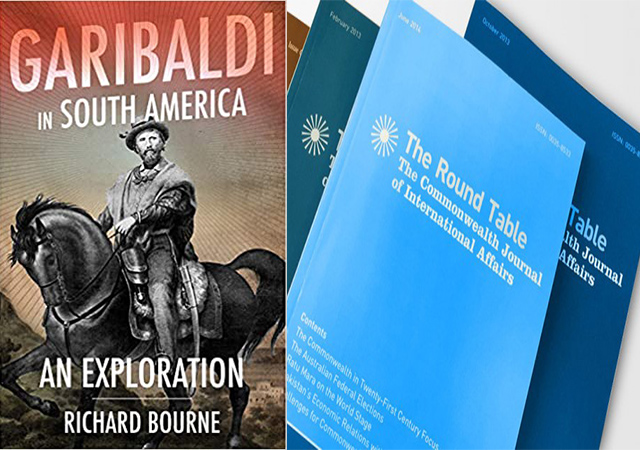
[This is an excerpt from an article in The Round Table: The Commonwealth Journal of International Affairs.]
Although best known to readers of The Round Table for his Commonwealth interests, Richard Bourne has been a significant commentator and reporter (for The Guardian among other publications) about all things South American for many years. His books on the Brazilian populist leader Lula (2008) and on other South American leaders have made him the Thomas Carlyle of British studies of the region. While Carlyle was mostly attracted by the classical heroes of early modern European history, and, especially, those of the French Revolutionary period, Frederick the Great of Prussia and so on, Bourne is more fascinated by the humble who rise to lead ordinary people to achieve incredible feats of courage in the face of impossible odds. In Lula he found a modern hero, and it is almost inevitable that he has now led us back to one of the greatest popular (note, not ‘populist’) heroes of the modern world, Giuseppe Garibaldi. He was one of the founders of modern Italy, along with Giuseppe Mazzini and Camillo Benso, Count Cavour.
Garibaldi has been rather neglected of late, not a figure evoked by the present-day architects of the ‘new’ Europe, who tend to emphasise boring technocrats like Jean Monnet, obscure Belgian desk warriors like Paul-Henri Spaak, or even French diplomats like Robert Schuman. All such worthies were born not long after the death of Garibaldi, not one of them makes the blood race like him. Who knows, had Garibaldi been a prominent symbol of a post-war unified Europe, Britain might have led it and Brexit would never have happened? This excellent account goes a long way to explain both why we should not forget Garibaldi and why his name has been unjustly forgotten, or at least downplayed in the halls of the Berlaymont and Strasbourg.
Bourne has written a book that fizzes with enthusiasm for the great liberal warrior who united Italy, not quite single-handedly, but who clearly was the major mover behind a task that seemed impossible at his birth in Nizza (Nice) in 1807. By his death in 1882 he had not only seen a united Italy (1861) he had helped or inspired the launch of a series of liberal nationalist movements across Europe and beyond. When I was at school in the 1960s Garibaldi was a household name, a man we were urged to emulate as a brave soldier and fine man, as long as we didn’t break school rules on the other things he did, like immoderate brawling, the wearing of colourful costumes and beards and chasing after girls of whom our parents disapproved. All of these injunctions led us to inevitable rebellion. The wild-eyed Italian was one of the few figures of the nineteenth century with whom we could totally identify, he seemed to be an early soixante-huitard. Bourne obviously agrees with us on much of that, and this volume shows to what extent he has followed the trail of Garibaldi over many years, and truly come to grips with the charisma and myth as much as the historical trail he left behind. Of course at many times in the text Bourne has to extemporise, there are so many competing myths, many of them encouraged by Garibaldi himself, but somehow that process makes his hero more real. It is a rattling good yarn, a real life Zorro film, without masks and with blood and guts aplenty.
Bourne realises that he has to base his account on some giants of world history, in this case George Trevelyan, and he is very complimentary about the people who have helped him to discover how Garibaldi lives on, not just in Italy, but also in South America. It was there that Garibaldi won his spurs as a soldier, seaman and leader of the dispossessed well before his exploits in Italy. What emerges in the account, which is written with verve and unfeigned admiration, is a man who refused to be cowed or bought. He was, as Bourne points out, not just a nationalist, but an internationalist, fighting for whatever cause he thought would increase the sum total of human freedom, in no way an aspirant dictator but a man of the people.
Such individuals are rare, and they are generally an embarrassment for they constantly hold up a mirror to the hypocrisy of the seekers after power with whom they inevitably find themselves in uneasy collaboration. In South America Garibaldi can be said to have been the main reason why Uruguay was able to stay out of the clutches of the expanding Brazilian Empire and the corrupt Argentinian Federation. He was, to be sure, on occasion able to benefit from the usually tacit support of British and French warships and diplomats who were keen to maximise the considerable commercial possibilities of the cattle-rich areas of Uruguay and Argentina. The story of Britain’s involvement in South American politics is rarely evoked, so this book gives us reason to reflect on what has happened in more recent history, like Britain’s war with Argentina in the 1980s. Plus ça change, plus c’est la même chose.
Andrew Williams is with University of St Andrews, St Andrews, Scotland.
Garibaldi in South America: an exploration by Richard Bourne, London, Hurst. 2020.



